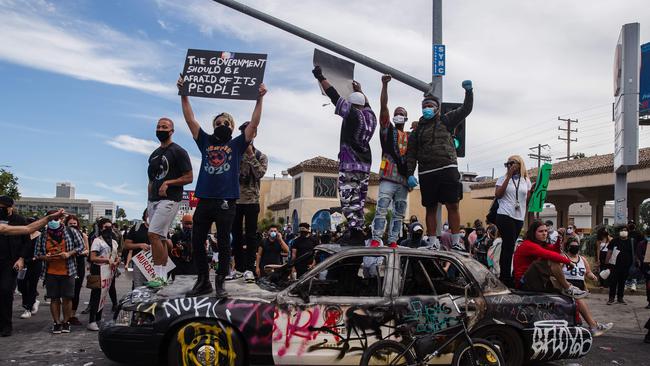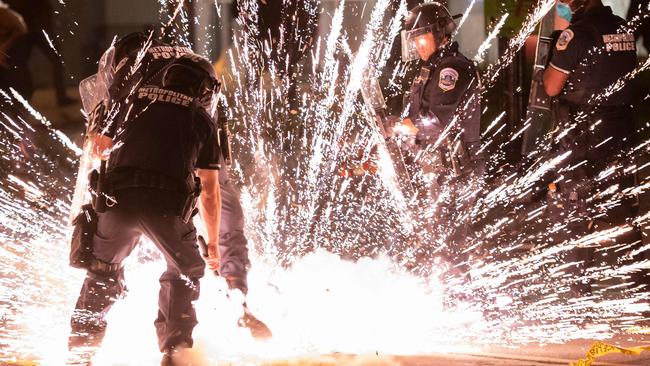
The deplorable schism that has reopened across the US over the past 10 days is almost as old as the American nation, but the tools and attitudes wedging it apart are entirely modern. In the best of ways and the worst of ways, the digital age has accentuated racial, social and political divisions that have always pulled at the seams of the union. Without camera-phones, few would have heard about the inexcusable killing of George Floyd. Perhaps his family would be asking questions of the Minneapolis police. Onlookers might be telling media they saw brutality. And an investigation might be under way pitting police accounts against eyewitness accounts.
Instead, that harrowing video recording of reality is ensuring justice is delivered, offering hope that such atrocities can be avoided in the future. As African-American comic Roy Wood Jr tweeted right at the outset, the device has done as much for civil rights as the most famous activists: “Black folk, it might be time for us to give a statue to the camera phone.”
On the other hand, digital media has instantaneously spread news, inflamed emotions, amplified resentment and encouraged knee-jerk reactions from crowds, activists, media and politicians. Tweeting as they march, Instagramming as they set buildings ablaze, the digital protesters encourage a dangerous one-upmanship among like-minded people.
Also, in the worst of ways, the President demonstrates the deleterious influence of social media on public discourse. Take Twitter out of Trump’s public statements and his presidency would have a completely different tone.

Ill-judged retorts, impromptu trolling, ill-considered pronouncements and unseemly personal reflections; this is what Trump has brought to the public debate, as so many do, through Twitter. He has cleverly used the medium to communicate directly with voters and avoid the relentless spin and antipathy of mainstream media.
But since his election, Trump’s use of this platform has only coarsened his image, confused his messaging and inflamed delicate situations — from global diplomacy to congressional negotiations and, now, a national crisis. A Trump presidency without tweeting would be less abrasive, reactive and divisive, and more considered, orthodox and reassuring.
It would be an administration judged on outcomes rather than rhetoric, substance rather than style. And, until the pandemic, it would have claimed significant achievements in economic recovery, tax cuts, border security and strategic assertiveness.
It is hardly breaking news that there is much to dislike about Trump. It has become beyond tedious to list his personal flaws, from egocentricity and pettiness to ignorance and boorishness. Yet he was successful in property development and show business, and in politics he has demonstrated something his opponents foolishly overlook — a genius for comprehending the frustrations of mainstream voters and their disdain for the political/media class.
The relentless criticism of Trump is as one-dimensional and counterproductive as any of his tweets. Trump’s adversaries were so infuriated by his election win, they let themselves be defined by their hatred. They have become caricatures of their own indignity, displaying the Trump derangement syndrome that has become wind beneath his West Wing.
None of this is new but it has never mattered more than this week. US society is torn apart so violently that police stations and cars were burnt by vandals, looters ran riot in many cities, police and others were shot dead, and curfews were imposed in dozens of cities, including Washington DC, but the media and political debate focused intensively on Trump.
When I first saw the full video of George Floyd’s killing last Wednesday week, I could not comprehend the callousness of Minneapolis police officer Derek Chauvin, keeping his weight on his knee while Floyd made desperate pleas and onlookers begged him to ease up. So I aired a clip on The Kenny Report, probably the first time the episode was shown on Australian television, because it showed the deep trauma of US racism was still a life-and-death issue.
Yet others watching this unfold see only Trump. Writing in The Atlantic, Adam Serwer had Trump directly responsible for the murder because in 2017 he made a quip about not wanting police to be “too nice” to violent thugs.
“When the Minneapolis police officer Derek Chauvin dug his knee into the back of George Floyd’s neck for nine minutes while Floyd pleaded for help, he was merely following the President’s advice,” wrote Serwer. This is what discourse has become: the unspeakable deeds of a Minnesota policeman, the cruel death of an African-American criminal and the inflammatory consequences for urban communities have become just another stick with which to beat the President.
Law-and-order responsibility rested on police forces and National Guard troops controlled by city mayors and state governors who, in most trouble spots, were Democrats. The core issues related to longstanding, deep-seated grievances about racial discrimination and policing of disadvantaged African-American communities that have confounded presidents from Abraham Lincoln to Barack Obama. Yet the blame and focus of the world’s media was not on race issues, law enforcement or rampant anarchy; rather the laser beam settled on Trump.
Certainly, in times of crisis, a president needs to show leadership and Trump is no Unifier-in-Chief. But when Robert Kennedy spoke eloquently on the night Martin Luther King was assassinated, it did not stop chaos erupting across the US. Empathy does not restore order or quell crowds. Taking a figurative knee will not appease Antifa.
Less than 12 years ago, Barack Obama was elected as the first African-American president and he, too, presided over race riots. And clearly, as we now see, he did not repair this social fissure.
The hysterical obsession with Trump and the endless hyperbole about him demeans those spewing it and distracts from the central issues. Here, media was preoccupied with a Channel 7 camera crew getting bundled out of the way by Washington riot police, trying to spin this into a vignette on the evils of Trump’s America.
People who ordinarily are intelligent, functioning adults descend into personal invective and putrid character assessments on Trump. Do they not see the irony, given their critique of Trump is that he is shallow and abusive?
We see the divide between mainstream concerns and media/political fashions play out dramatically. People horrified by opportunistic lawlessness (mobs smashing windows, setting fire to cars, looting shops and terrorising neighbourhoods) have seen commentators like CNN’s Chris Cuomo, brother of New York Democrat Governor Andrew Cuomo, saying; “Please show me where it says protesters are supposed to be polite and peaceful.”
Well, try Martin Luther King Jr. “I am convinced that even violent temperaments can be channelled through non-violent discipline,” said King, “if they can act constructively and express through an effective channel their very legitimate anger.” So distorted is the debate that liberal media cannot even agree to unambiguously oppose violence in protests. African-American activist and broadcaster Mark Thompson told me this week that Trump was trying to start a “civil war” and upbraided me for referring to riots. “We use the term rebellion,” he said.
The term law and order has been decried as racist. White citizens have been intimidated into kneeling on the street and apologising for their privilege.
Which brings me back to the millennial mindset. Shallow as Trump, they care not for history. Abysmal education systems leave them either ignorant or disdainful about the value of our institutions. Catastrophist indoctrination leaves them eager to dismiss all that has gone before them, and media that should be moderating and informative chooses to live in the disposable digital moment.
Young reporters describe the current chaos as something instigated by Trump. They are blind to the generational threads of racial and social discord, or the opportunism of the President’s opponents who are happy to fan these flames as a political weapon against him.
They ignore questions about the racial divide, social dysfunction, police brutality, law and order, lack of community values, diminished respect for authority, and the absence of personal values that sees mobs smash their way into shops and take what doesn’t belong to them, simply because they think they can get away with it. For Trump to fix any of this, he would need to be greater than Abraham Lincoln.
Democrat activists are now proudly cheering “defund the police” along with the lawless mobs. The liberal left and the media/political class might realise, all too late, that they are fostering a clear-cut law-and-order debate in an election year, and putting themselves on the wrong side of it.




Self-fascinated, impetuous, aggressive, obsessed with social media and ignorantly disdainful of history or precedent, millennials have much more in common with Donald Trump than sets them apart. Perhaps that is why they are consumed with hatred for the US President; they sense they are seeing their older selves in the mirror.